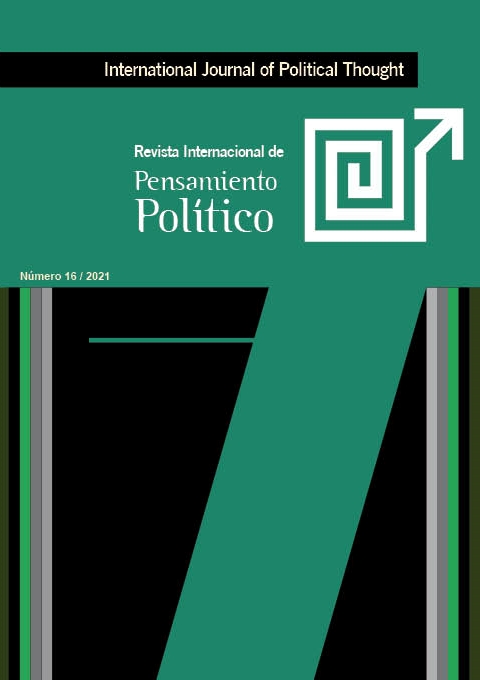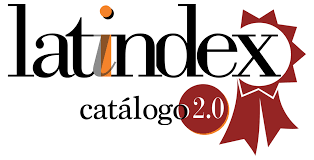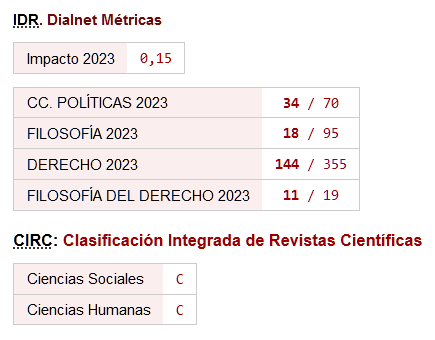Apuntes para una refundamentación de la democracia
DOI:
https://doi.org/10.46661/revintpensampolit.6065Palabras clave:
democracia, constituyente, autodeterminación, republicanismo, deliberacionismoResumen
Desde un enfoque normativo e interdisciplinario se realiza una crítica a la democracia liberal-representativa a partir del modelo principal-agente, lo cual supone identificar un conflicto de interés político que vicia el gobierno representativo. Se muestra, a continuación, cómo ese conflicto, en distintas versiones, aparece en teorías de la ciencia política, la administración pública y el derecho, y que su resolución reiteradamente implica cierta separación de poderes. Con base en este análisis, se propone un nuevo fundamento para la democracia, consistente en la propiedad popular directa del sistema político, que puede institucionalizarse en un Poder Ciudadano.
Descargas
Citas
Abizadeh, A. (2020). "Representation, bicameralism, political equality, and sortition: reconstituting the second chamber as a randomly selected assembly", Perspectives on Politics, 1-16.
https://doi.org/10.1017/S1537592719004626
Abulof, U. (2015). "The confused compass: from self-determination to state-determination", Ethnopolitics, vol. 14, no. 5, 488-497.
https://doi.org/10.1080/17449057.2015.1051809
Azzellini, D. (2016). "Constituent and constituted power: reading social transformation in Latin America", en E. Betances y C. Figueroa Ibarra (eds.) Popular sovereignty and constituent power in Latin America: democracy from below, Nueva York, Palgrave Macmillan, 15-40.
https://doi.org/10.1057/978-1-137-54825-2_2
Bello Hutt, D. (2018). "Republicanism, deliberative democracy, and equality of access and deliberation", Theoria, vol. 84, 83-111.
https://doi.org/10.1111/theo.12138
Bohman, J. (2007). Democracy across borders: from demos to demoi, Cambridge, MIT.
https://doi.org/10.7551/mitpress/2327.001.0001
Bouricius, T. (2018). "Why hybrid bicameralism is not right for sortition", Politics & Society, vol. 46, no. 3, 435-451.
https://doi.org/10.1177/0032329218789893
Bouricius, T. G. (2013). "Democracy through multi-body sortition: Athenian lessons for the modern day", Journal of Public Deliberation, vol. 9, no. 1, 1-19.
https://doi.org/10.16997/jdd.156
Bovens, M., Schillemans, T. y Goodin, R. E. (2014). "Public accountability", en M. Bovens, R. E. Goodin y T. Schillemans (eds.) The Oxford handbook of public accountability, Nueva York, Oxford, 1-21.
https://doi.org/10.1093/oxfordhb/9780199641253.013.0012
Brennan, G. y Hamlin, A. (2000). Democratic devices and desires, Nueva York, Cambridge.
https://doi.org/10.1017/CBO9780511490194
Buchstein, H. (2019). "Democracy and lottery: revisited", Constellations, vol. 26, 361-377.
https://doi.org/10.1111/1467-8675.12429
Buchstein, H. (2010). "Reviving randomness for political rationality: elements of a theory of aleatory democracy", Constellations, vol. 17, no. 3, 435-454.
https://doi.org/10.1111/j.1467-8675.2010.00604.x
Burnheim, J. (2006). Is democracy possible? The alternative to electoral democracy, Sidney, Sidney University.
https://doi.org/10.30722/sup.9781920898427
Carolan, E. (2009). The new separation of powers: a theory for the modern state, Nueva York, Oxford.
https://doi.org/10.1093/acprof:oso/9780199568673.001.0001
Carretero Pasin, E. (2008). Religiosidades instituyentes/religiones instituidas", Nómadas. Revista Crítica de Ciencias Sociales y Jurídicas, vol. 18, no. 2.
Carrozza, P. (2007). "Constitutionalism's post-modern opening", en M. Loughlin y N. Walker (eds.) The paradox of constitutionalism: constituent power and constitutional form, Nueva York, Oxford, 169-187.
https://doi.org/10.1093/acprof:oso/9780199552207.003.0010
Christodoulidis, E. (2007). "Against substitution: the constitutional thinking of dissensus", en M. Loughlin y N. Walker (eds.) The paradox of constitutionalism: constituent power and constitutional form, Nueva York, Oxford, 189-208.
https://doi.org/10.1093/acprof:oso/9780199552207.003.0011
Church, J. (2012). "G.W.F. Hegel on self-determination and democratic theory", American Journal of Political Science, vol. 56, no. 4, 1021-1039.
https://doi.org/10.1111/j.1540-5907.2012.00609.x
Colón-Ríos, J. I. (2012). Weak constitutionalism: democratic legitimacy and the question of constituent power, Nueva York, Routledge.
https://doi.org/10.4324/9780203120132
Crouch, C. (2004). Posdemocracia, México DF, Santillana.
Dahl, R. A. (1992). La democracia y sus críticos, Rubí, Paidós.
Damgaard, B. y Lewis, J. M. (2014). "Accountability and citizen participation", en M. Bovens, R. E. Goodin y T. Schillemans (eds.) The Oxford handbook of public accountability, Nueva York, Oxford, 259-273.
Danisor, D. C. (2018). "The Expert or the People? On the justification of the autonomous authorities", Revista de Științe Politice, vol. 57, 13-24.
Davis, M. (1982). "Conflict of interest", Business & Professional Ethics Journal, vol. 1, no. 4, 17-27.
https://doi.org/10.5840/bpej1982149
Dryzek, J. S. (2010). "Mini-publics and their macro consequences", En J. S. Dryzek y S. Niemeyer Foundations and frontiers of deliberative governance, Bodmin y King's Lynn, Oxford, 155-176.
https://doi.org/10.1093/acprof:oso/9780199562947.003.0008
Fan, H. (2008). "The missing link between self-determination and democracy: the case of East Timor", Northwestern Journal of International Human Rights, vol. 6, no. 1, 176-195.
Ferejohn, J. (2008). "Conclusion: the Citizens' Assembly model", en M. E. Warren y H. Pearse (eds.) Designing deliberative democracy: the British Columbia citizens' assembly, Nueva York, Cambridge, 192-213.
https://doi.org/10.1017/CBO9780511491177.011
Ferejohn, J. (1999). "Accountability and authority: toward a theory of political accountability", en A. Przeworski, S. C. Stokes y B. Manin (eds.) Democracy, accountability, and representation, Nueva York, Cambridge, 131-153.
https://doi.org/10.1017/CBO9781139175104.005
Franck, T. M. (1992). "The emerging right to democratic governance", The American Journal of International Law, vol. 86, no. 1, 46-91.
https://doi.org/10.2307/2203138
Fung, A. (2006). "Democratizing the policy process", en M. Moran, M. Rein y R. E. Goodin (eds.) The Oxford handbook of public policy, Nueva York, Oxford, 669-685.
Gailmard, S. (2014). "Accountability and principal-agent models", en M. Bovens, R. E. Goodin y T. Schillemans (eds.) The Oxford handbook of public accountability, Nueva York, Oxford, 91-106.
Gastil, J. (2000). By popular demand: revitalizing representative democracy through deliberative elections, Berkeley y Los Angeles, University of California.
Gastil, J. y Richards, R. (2013). "Making direct democracy deliberative through random assemblies", Politics & Society, vol. 41, no. 2, 253-281.
https://doi.org/10.1177/0032329213483109
Gastil, J. y Wright, E. O. (2018). "Legislature by lot: envisioning sortition within a bicameral system", Politics & Society, vol. 46, no. 3, 303-330.
https://doi.org/10.1177/0032329218789886
Goodin, R. E. (2012). "How can deliberative democracy get a grip?", The Political Quarterly, vol. 83, no. 4, 806-811.
https://doi.org/10.1111/j.1467-923X.2012.02356.x
Guerrero, A. A. (2014). "Against elections: the lottocratic alternative", Philosophy & Public Affairs, vol. 42, no. 2, 135-178.
https://doi.org/10.1111/papa.12029
Habermas, J. (1996). Between facts and norms: contributions to a discourse theory of law and democracy, Cambridge, MIT.
https://doi.org/10.7551/mitpress/1564.001.0001
Hamilton, L. (2014). Freedom is power: liberty through political representation, Cambridge, Cambridge.
https://doi.org/10.1017/CBO9781107477698
Hartz-Karp, J. y Briand, M. K. (2009). "Institutionalizing deliberative democracy", Journal of Public Affairs, vol. 9, 125-141.
https://doi.org/10.1002/pa.320
Heidelberg, R. L. (2020). "Ten theses on accountability", Administrative Theory & Praxis, vol. 42, no. 1, 6-26.
https://doi.org/10.1080/10841806.2018.1512340
Jenkins, R. (2007). "The role of political institutions in promoting accountability", en A. Shah (ed.) Performance, accountability and combating corruption, Washington DC, The World Bank, 135-181.
Katz, R. S. (2014). "No man can serve two masters: Party politicians, party members, citizens and principal-agent models of democracy", Party Politics, vo. 20, no. 2, 183-193.
https://doi.org/10.1177/1354068813519967
Kuhn, T. S. (1971). La estructura de las revoluciones científicas, México DF, FCE.
Lafont, C. (2020). Democracy without shortcuts: a participatory conception of deliberative democracy, Nueva York, Oxford.
https://doi.org/10.1093/oso/9780198848189.001.0001
Lancaster, T. D. y Abdalla, R. (2018). "Independent regulatory authorities as mechanisms of political monitoring", Indian Journal of Public Administration, vol. 64, no. 3, 331-348.
https://doi.org/10.1177/0019556118788483
Landwehr, C. (2015). "Democratic meta-deliberation: towards reflective institutional design", Political Studies, vol. 63, no. S1, 38-54.
https://doi.org/10.1111/1467-9248.12158
Leib, E. J. (2004). Deliberative democracy in America: a proposal for a popular branch of government, University Park, Pennsylvania State University.
Lindahl, H. (2007). "Constituent power and reflexive identity: towards an ontology of collective selfhood", en M. Loughlin y N. Walker (eds.) The paradox of constitutionalism: constituent power and constitutional form, Nueva York, Oxford, 9-24.
https://doi.org/10.1093/acprof:oso/9780199552207.003.0002
Locke (2000 [1689]). Locke: political essays, Nueva York, Cambridge.
Loughlin, M. y Walker, N. (2007). "Introduction", en M. Loughlin y N. Walker (eds.) The paradox of constitutionalism: constituent power and constitutional form, Nueva York, Oxford, 1-8.
https://doi.org/10.1093/acprof:oso/9780199552207.003.0001
MacKenzie, M. K. (2016). "A general-purpose, randomly selected chamber", en Iñigo González-Ricoy y Axel Gosseries (eds.) Institutions for future generations, Nueva York, Oxford, 283-299.
https://doi.org/10.1093/acprof:oso/9780198746959.003.0017
Mair, P. (2013). Ruling the void: the hollowing of Western democracy, Nueva York: Verso.
Majone, G. (2001). "Two logics of delegation. Agency and fiduciary relations in EU governance", European Union Politics, vol. 2, no. 1, 103-122.
https://doi.org/10.1177/1465116501002001005
Maloy, J. S. (2015). "Intermediate conditions of democratic accountability: a response to electoral skepticism", Politics and Governance, vol. 3, no. 2, 76-89.
https://doi.org/10.17645/pag.v3i2.238
Maloy, J. S. (2014). "Linkages of electoral accountability: empirical results and methodological lessons", Politics and Governance, vol. 2, no. 2, 13-27.
https://doi.org/10.17645/pag.v2i2.24
Manin, B. (1997). The principles of representative government, Nueva York, Cambridge.
https://doi.org/10.1017/CBO9780511659935
Manin, B., Przeworski, A. y Stokes, S. C. (1999). "Elections and representation", en A. Przeworski, S. C. Stokes y B. Manin (eds.) Democracy, accountability, and representation, Nueva York, Cambridge, 29-54.
https://doi.org/10.1017/CBO9781139175104.002
Maquiavelo (2011 [1531]). "Discursos sobre la primera década de Tito Livio", en Maquiavelo, Madrid, Gredos, 245-633.
Maravall, J. M. (1999). "Accountability and manipulation", en A. Przeworski, S. C. Stokes y B. Manin (eds.) Democracy, accountability, and representation, Nueva York, Cambridge, 154-196.
https://doi.org/10.1017/CBO9781139175104.006
McCormick, J. P. (2011). Machiavellian democracy, Nueva York, Cambridge.
McCormick, J. P. (2007). "People and elites in republican constitutions, traditional and modern", en M. Loughlin y N. Walker (eds.) The paradox of constitutionalism: constituent power and constitutional form, Nueva York, Oxford, 107-125.
https://doi.org/10.1093/acprof:oso/9780199552207.003.0007
McNamara, K. R. (2002). "Rational fictions: central bank independence and the social logic of delegation", West European Politics, vol. 25, no. 1, 47-76.
https://doi.org/10.1080/713601585
Miller, G. J. (2005). "The political evolution of principal-agent models", Annual Review of Political Science, vol. 8, 203-225.
https://doi.org/10.1146/annurev.polisci.8.082103.104840
Montesquieu (1989 [1748]). The spirit of the laws, Nueva York, Cambridge.
Murakami, M. H. (2008). "Paradoxes of democratic accountability: polarized parties, hard decisions, and no despot veto", Critical Review, vol. 20, no. 1-2, 91-113.
https://doi.org/10.1080/08913810802316365
Negretto, G. L. (2017). "Constitution making in democratic constitutional orders: the challenge of citizen participation", en S. P. Ruth, Y. Welp y L. Whitehead (eds.) Let the people rule? Direct democracy in the twenty-first century, Colchester, ECPR, 21-39.
Negri, A. (1999). Insurgencies: constituent power and the modern state, Minneapolis, University of Minnesota.
Niemeyer, S. y Jennstal, J. (2018). "Scaling up deliberative effects - applying lessons of mini-publics", en A. Bachtiger, J. S. Dryzek, J. Mansbridge y M. E. Warren (eds.) The Oxford handbook of deliberative democracy, Nueva York, Oxford, 330-348.
https://doi.org/10.1093/oxfordhb/9780198747369.013.31
Olsen, J. P. (2013). "The institutional basis of democratic accountability", West European Politics, vol. 36, no. 3, 447-473.
https://doi.org/10.1080/01402382.2012.753704
Owen, D. y Smith, G. (2018). "Sortition, rotation, and mandate: conditions for political equality and deliberative reasoning", Politics & Society, vol. 46, no. 3, 419-434.
https://doi.org/10.1177/0032329218789892
Parkinson, J. (2003). "Legitimacy problems in deliberative democracy", Political Studies, vol. 51, 180-196.
https://doi.org/10.1111/1467-9248.00419
Parkinson, J. y Mansbridge, J. (2012). Deliberative systems: deliberative democracy at the large scale, Nueva York, Cambridge.
https://doi.org/10.1017/CBO9781139178914
Philp, M. (2009). "Delimiting democratic accountability", Political Studies, vol. 57, 28-53.
https://doi.org/10.1111/j.1467-9248.2008.00720.x
Philpott, D. (1995). "In defense of self-determination", Ethics, vol. 105, no. 2, 352-385.
https://doi.org/10.1086/293704
Piketty, T. (2014). El capital en el siglo XXI, México DF, FCE.
Rubinelli, L. (2020). Constituent power: a history, Padstow, Cambridge.
https://doi.org/10.1017/9781108757119
Salazar Carrión, L. (coord.) (2014). ¿Democracia o posdemocracia? Problemas de la representación política en las democracias contemporáneas, México DF, Fontamara.
Sartori, G. (2002). Elementos de teoría política, Madrid, Alianza.
Saward, M. (2000). "Less than meets the eye: democratic legitimacy and deliberative theory", en M. Saward (ed.) Democratic innovation: deliberation, representation and association, Nueva York, Routledge, 66-77.
Schedler, A. (1999). "Conceptualizing accountability", en A. Schedler, L. Diamond y M. F. Plattner (eds.) The self-restraining state, Londres, Lynne Rienner , 13-28.
Schulson, M. y S. Bagg (2019, 19 julio). "Give political power to ordinary people", Dissent, https://www.dissentmagazine.org/online_articles/give-political-power-to-ordinary-people-sortition.
Setala, M. (2017). "Connecting deliberative mini-publics to representative decision making", European Journal of Political Research, vol. 56, 846-863.
https://doi.org/10.1111/1475-6765.12207
Sintomer, Y. (2018). "From deliberative to radical democracy? Sortition and politics in the twenty-first century", Politics & Society, vol. 46, no. 3, 337-357.
https://doi.org/10.1177/0032329218789888
Sintomer, Y. (2010). "Random selection, republican self-government, and deliberative democracy", Constellations, vol. 17, no. 3, 472-487.
https://doi.org/10.1111/j.1467-8675.2010.00607.x
Smith, G. (2009). Democratic innovations: designing institutions for citizen participation, Nueva York, Cambridge.
https://doi.org/10.1017/CBO9780511609848
Smith, G. (2000). "Toward deliberative institutions", en M. Saward (ed.) Democratic innovation: deliberation, representation and association, Nueva York, Routledge, 29-39.
Smith, G. y Setala, M. (2018). "Mini-publics and deliberative democracy", en A. Bachtiger, J. S. Dryzek, J. Mansbridge y M. E. Warren (eds.) The Oxford handbook of deliberative democracy, Nueva York, Oxford, 301-315.
https://doi.org/10.1093/oxfordhb/9780198747369.013.27
Spang, M. (2014). Constituent power and constitutional order: above, within and beside the constitution, Basingstoke, Palgrave Macmillan.
Stempien, J. R. (2012). "Use of the 'principal-agent' model in the process of investigating and analyzing representative democratic systems", Przegląd Socjologiczny, vol. 61, no. 4, 99-121.
Thatcher, M. y Sweet, A. S. (2002). "Theory and practice of delegation to non-majoritarian institutions", West European Politics, vol. 25, no. 1, 1-22.
https://doi.org/10.1080/713601583
Thompson, D. F. (2008). "Who should govern who governs? The role of citizens in reforming the electoral system", en M. E. Warren y H. Pearse (eds.) Designing deliberative democracy: the British Columbia citizens' assembly, Nueva York, Cambridge, 20-49.
https://doi.org/10.1017/CBO9780511491177.003
Tully, J. (2007). "The imperialism of modern constitutional democracy", en M. Loughlin y N. Walker (eds.) The paradox of constitutionalism: constituent power and constitutional form, Nueva York, Oxford, 315-338.
https://doi.org/10.1093/acprof:oso/9780199552207.003.0017
Urbinati, N. (2006). Representative democracy: principles and genealogy, Chicago, University of Chicago.
https://doi.org/10.7208/chicago/9780226842806.001.0001
Urbinati, N. (2004). "Condorcet's democratic theory of representative government", European Journal of Political Theory, vol. 3, no. 1, 53-75.
https://doi.org/10.1177/1474885104038990
Valadez, J. M. (2001). Deliberative democracy, political legitimacy, and self-determination in multicultural societies, Boulder, Westview.
Vandamme, P-E. y Verret-Hamelin, A. (2017). "A randomly selected chamber: promises and challenges", Journal of Public Deliberation, vol. 13, no. 1, 1-24.
https://doi.org/10.16997/jdd.271
Van Reybrouck, D. (2016). Against elections: the case for democracy, Londres, The Bodley Head.
Vergara, C. (2020). Systemic corruption: constitutional ideas for an anti-oligarchic republic, Princeton, Princeton.
https://doi.org/10.23943/princeton/9780691207537.001.0001
Vibert, F. (2007). The rise of the unelected: democracy and the new separation of powers, Nueva York, Cambridge.
https://doi.org/10.1017/CBO9780511491160
Vile, M. J. C. (1998). Constitutionalism and the separation of powers, Indianapolis, Liberty Fund.
Warren, M. E. (2014). "Accountability and democracy", en M. Bovens, R. E. Goodin y T. Schillemans (eds.) The Oxford handbook of public accountability, Nueva York, Oxford, 40-55.
Warren, M. E. (2010). "Beyond the self-legislation model of democracy", Ethics & Global Politics, vol. 3, no. 1, 47-54.
https://doi.org/10.3402/egp.v3i1.4853
Warren, M. E. (2008). "Citizen representatives", en M. E. Warren y H. Pearse (eds.) Designing deliberative democracy: the British Columbia citizens' assembly, Nueva York, Cambridge, 50-69.
https://doi.org/10.1017/CBO9780511491177.004
Warren, M. E. y Pearse, H. (2008). "Introduction: democratic renewal and deliberative democracy", en M. E. Warren y H. Pearse (eds.) Designing deliberative democracy: the British Columbia citizens' assembly, Nueva York, Cambridge, 1-19.
https://doi.org/10.1017/CBO9780511491177.002
Waterman, R. W. y Meier, K. J. (1998). "Principal-agent models: an expansion?", Journal of Public Administration Research and Theory, vol. 8, no. 2, 173-202.
Descargas
Publicado
Cómo citar
Número
Sección
Licencia
Derechos de autor 2022 Guillem Compte Nunes

Esta obra está bajo una licencia internacional Creative Commons Atribución-NoComercial-CompartirIgual 4.0.
Política de acceso abierto
Se permite el acceso libre y abierto de cualquier interesado a todos los contenidos de los números de la revista, sin costo alguno, pudiendo imprimir y trasladar todos los artículos, con la única condición de precisar la fuente y la autoría.
La revista: a) no cobra a las autorías costes por el procesamiento de los artículos ni por el envío de los mismos, b) mantiene el copyright para los autores sin restricciones, c) facilita a los autores conservar sus derechos de publicación sin limitaciones.
La Revista Internacional de Pensamiento Político es una obra original del Laboratorio de Ideas y Prácticas Políticas de la Universidad Pablo de Olavide. Todos los artículos incluidos en la Revista son obra original de sus respectivas autorías. Esta Revista se ofrece libremente a la comunidad científica y académica sin coste alguno y libera los contenidos de acuerdo a la licencia "Reconocimiento-NoComercial-CompartirIgual 4.0 CC BY-NC-SA" del proyecto Creative Commons dispuesta en la siguiente url: https://creativecommons.org/licenses/by-nc-sa/4.0/legalcode
Si deseas traducir o compilar alguno de los artículos aquí disponibles, por favor, ponte en contacto













